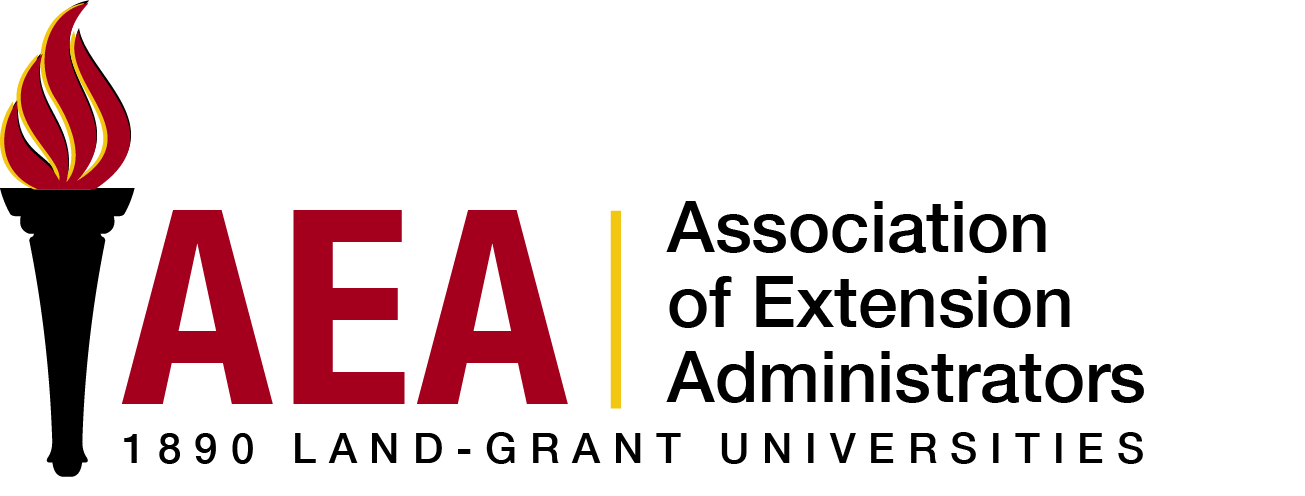Extension Today
News from and about the 1890 Land-Grant Extension SystemMessage from the Chair
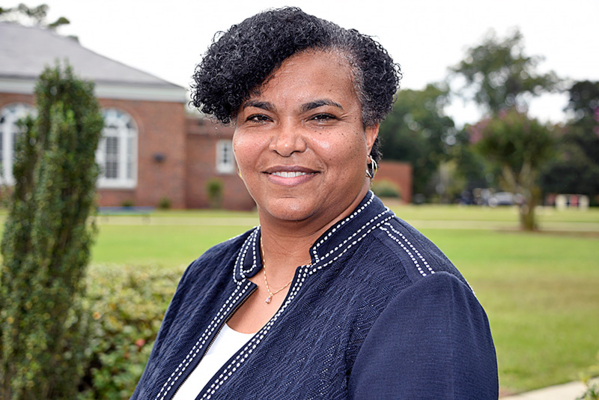
Vonda Richardson Extension Administrator, Florida A&M University
Welcome to this month’s Extension Today newsletter! For October, we are highlighting innovative technology.
As a rapid response vehicle for small farm communities, 1890 Cooperative Extension provides research-based, new technology to enhance operations and improve viability. Whether it is aquaculture, horticulture or a related program, 1890 Extension professionals are ready to address, inform and teach those who may not have access to such technology.
AEA commends all of our professionals engaged in innovative agricultural technology advancements for the betterment of small farms, the environment and communities. I hope you enjoy this issue.
STEM in the Garden
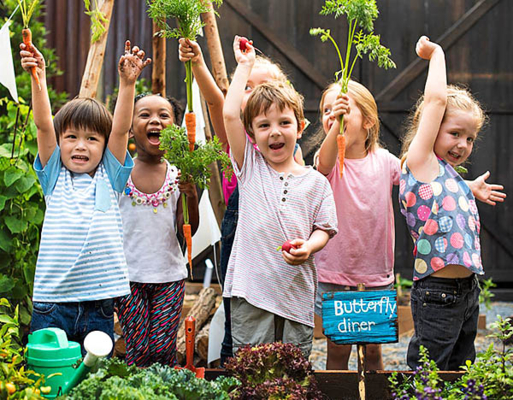
The STEM in the Garden Teacher Training Workshop is a train-the-trainer program designed to provide educators with the knowledge and skills to establish outdoor classrooms or educational gardens. This program also supports state curriculum goals, particularly related to science, technology, engineering and mathematics (STEM). Specifically, teachers learn about edible, vegetable, pollinator and raised bed gardens, pest and disease management, and natural resources practices, including water conservation methods.
Program Delivery and Impacts
STEM in the Garden was created in the fall of 2019 for on-site delivery. COVID-19 struck, and the program transitioned online in 2020 and 2021. During the past two years, 330 people have participated, averaging 55 educators a lesson in the six-lesson series. As a result of this training, 114 continuing education units were awarded. In addition, 93 percent of those surveyed planned to apply course practices to outdoor classrooms. Participants also saved $62 by using what they learned in the series.
The Future
With the success of the workshop series, Extension Specialist Dr. Rudy Pacumbaba was awarded an 1890 Institution Teaching, Research and Extension Capacity Building Grant from the United States Department of Agriculture’s (USDA) National Institute of Food and Agriculture (NIFA) for 2022-2025. The funding will expand STEM in the Garden by creating a mobile lab, offering turnkey gardens to school systems and increasing outreach to both urban and rural communities.
Central State University Aquaponics Demonstration Center home to training, field days
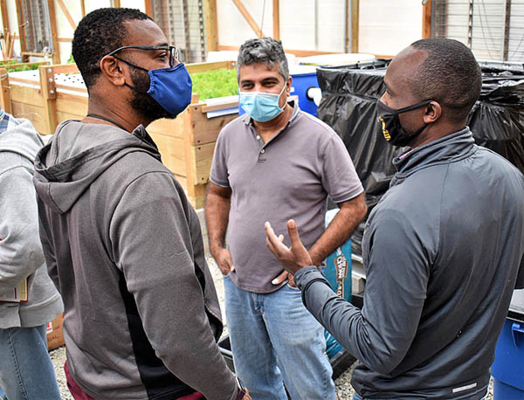
Sharing educational programs on several methods of aquaponics, the Central State University Aquaponics Demonstration Facility hosts field days and educational programs to share research-based aquaponics information.
The CSUE aquaponics operation is currently raising approximately 200 tilapia within its greenhouse, as well as a variety of greens, herbs and cucumbers.
“Aquaponics is a closed loop system that combines conventional aquaculture (the raising of aquatic animals such as snails, fish, crayfish or prawns in tanks) with hydroponics (cultivating plants in water) in a mutually symbiotic environment. The aquaponics system utilizes the waste of one element for the benefit of another. In this case, the waste produced by the fish benefits the growing plants,” says CSUE Program Leader for Agricultural and Natural Resources Dr. Cindy Folck.
Both demonstration and research systems are operated by CSUE.
“Central State has two aquaponics systems, one for research and one for community engagement and workshops,” says Dr. Krishna Kumar Nedunuri, CSUE researcher for aquaponics, professor of environmental engineering and director of the International Center for Water Resources Management at CSU.
For more information, contact Folck at afolck@CentralState.edu or (937) 376-6101.
Taking Delaware aquaculture to the next level
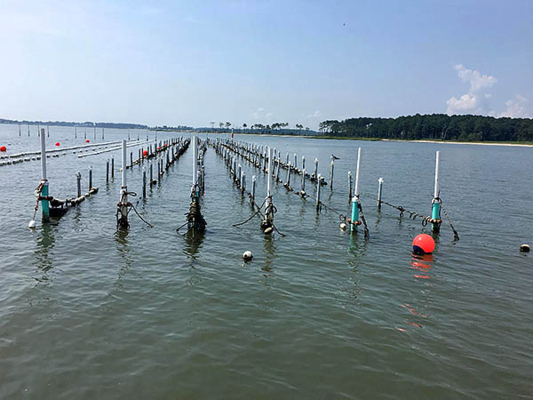
During the month of October, Delaware State University (DSU) Cooperative Extension showcases the efforts of Dr. Dennis McIntosh, aquaculture specialist, to cultivate a more robust aquaculture industry in the First State.
Commercial oyster landing records from Delaware Bay date back to the 1880s and show that harvesting oysters formed an important economic and social component of the fabric of Delaware. Today, commercial quotas represent only a small fraction of historical catches. Aquaculture, the cultivation of aquatic organisms, in the state is currently limited by the total number of commercial producers and species produced, though this technology has the potential to be a valuable supplement to Delaware’s fisheries. In 2013, then-Governor Jack Markell signed legislation allowing the leasing of subaqueous lands in the Inland Bays for shellfish aquaculture. This represents a significant opportunity to expand Delaware’s aquaculture industry. It also poses a challenge as there is a new/expanded demand for technical assistance, education and outreach. (FAIC Big Picture)
Innovative technology program
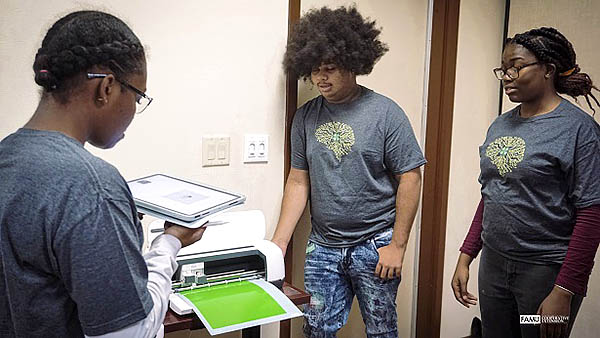
4-H Tech Changemakers is a teen youth program focused on technology and teaches youth about coding, engineering, digital literacy, web design, graphic design, cybersecurity and more.
The program is designed for beginners and advanced students alike. Tech Changemakers teen training utilizes various teaching methods. It delivers the curriculum to teens to encourage students to be creative and inquisitive while making their learning experience fun. Using varied teaching methods allows teens to develop and explore new skills while furthering their knowledge. As teens build these new digital and technological skills, they provide workshops to the community to help teach digital skills to others.
Tech Changemakers use technology to support education, entrepreneurship, employment and empowerment, eliminating poverty and ensuring equity for all. Teens are learning Geographic Information System Mapping (GIS), drone operation and 3-D printing this year. The program is not only helping teens to understand the opportunities in technology and engineering but helping teens inform and empower their neighborhoods to understand their potential and raise aspirations.
Making waves at Fort Valley State University
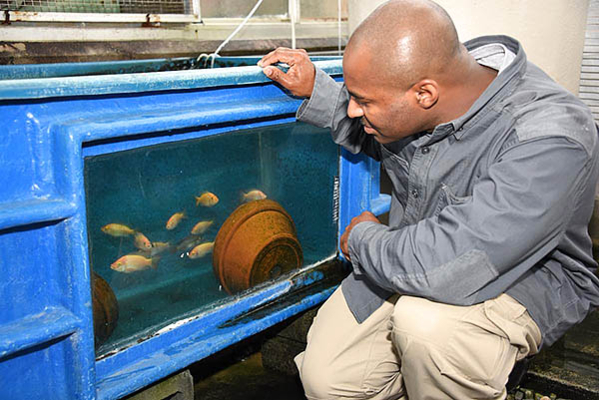
Fort Valley State University maintains the Georgia Center for Aquaculture Development, which offers training courses and maintains demonstrations and prototypes of various systems to be seen and considered.
Currently, FVSU is culturing tilapia, koi, catfish, bream, pacu and various plants such as duckweed, tomatoes, cucumbers, peppers, pineapple, mint and blueberries in recirculating and aquaponic systems in the campus Greenhouse Complex and new farm Aquaculture Facility greenhouses.
Outreach activities include aquaculture greenhouse tours and exhibits at Ag Field Day at the Village Community Garden in Sylvester, Georgia, and the Sunbelt Ag Expo in Moultrie, Georgia. Other activities include hosting Georgia Aquaculture and Aquaponic Network meetings, a Sustainable Aquaponics workshop in Macon, Georgia, and a Georgia Commercial Aquaculture Zoom workshop. Some client outreach activities include mitigating bass nematodes and weeds in lakes. Construction projects include greenhouse complex aquaculture room renovations, three new aquaponic systems, three recirculating aquaculture systems and 20 ponds.
For more information, contact Donald Bacoat, aquaculture carpenter and production assistant, at (478) 825-6786 or bacoatd@fvsu.edu.
Kentucky State University welcomed public to celebrate, learn about pawpaws
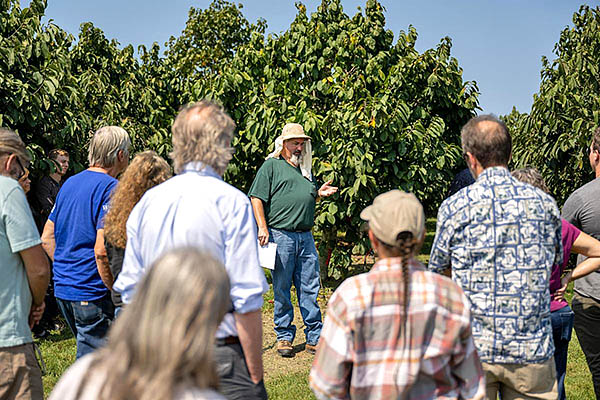
In September, the Kentucky State University Land Grant Program hosted more than 100 people in person and additional virtual viewers to celebrate and learn about pawpaws at Third Thursday Thing.
Now in its 25th year, Third Thursday Thing is Kentucky State’s monthly sustainable agriculture workshop for Kentucky farmers and producers. To align with the annual pawpaw harvest, September is always all about pawpaws. The third Thursday in September is also certified as National Pawpaw Day.
Several people attended Third Thursday for the very first time. Others return each year to hear updates about Kentucky State University’s pawpaw research, learn tips about the production of pawpaws, see a processing demonstration and more. Attendees also get to tour Kentucky State’s pawpaw orchards, which are part of the United States Department of Agriculture (USDA) National Clonal Germplasm Repository, housed at Kentucky State since 1994.
One attendee, Benjamin Baque, came all the way from France to go on a pawpaw tour in the U.S. He first came to Third Thursday several years ago to learn how to establish a pawpaw orchard. He now has 12 pawpaw trees and has been back twice more to learn from Kentucky State’s pawpaw researchers.
Impacting the sustainability of the Oklahoma aquaponics industry through Extension, education
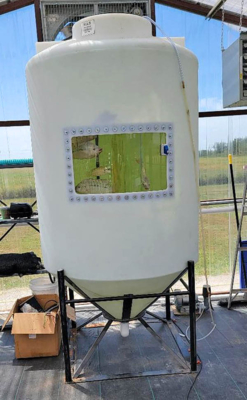
Langston University School of Agriculture & Applied Sciences (LU-SAAS) Aquaponics Program is assisting the infant aquaponics industry as one solution to the extensive food deserts in Oklahoma. The aquaponics industry in Oklahoma is rapidly growing and is now composed of more than 200 beginning farmers.
LU-SAAS assists these producers through funding provided by the United States Department of Agriculture (USDA) and the National Institute of Food and Agriculture (NIFA). This funding supports targeted aquaponics Extension programs and academic scholarships.
Seven workshops were offered through a collaborative partnership between LU-SAAS and Olive Branch Aquaponics LLC in Beggs, Oklahoma. The workshops improve the information exchange among the various stakeholders, especially the rapidly growing producer population outside of Tulsa, Oklahoma. Presentations targeted facility planning, operations, fish health, water quality management, farm safety and integrated pest management. The workshops attracted between 35-40 producers with various stages of expertise.
Additional workshops are planned in the coming year with facilities and landowners. Future collaborations with Olive Branch Aquaponics will include the aquaponic production of freshwater prawns and a planned plant variety testing during spring 2023.
Innovative technology

By Ricky Dana
With the advent of the COVID pandemic and the expansion of the internet, technology has become woven into every facet of our lives. It has changed how we conduct business, exchange information and how we interact with each other. It has even impacted how we receive health care services.
Telehealth companies have now become a popular option in the health care industry for their convenience and affordability. Since internet access is available to most Americans — including those in rural areas or low-income individuals — virtual medical and mental health visits have now become normalized.
This article discusses innovative technology and its importance to medical care access for at-risk individuals, including the elderly and those who may be immunosuppressed.
Raising crops, building community on a former plantation
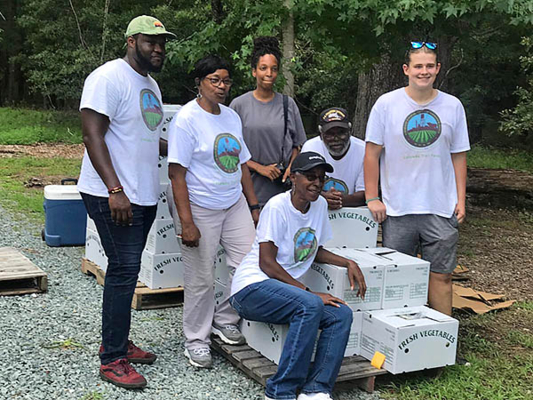
Technically, Delphine Sellars is a retiree, but to say she keeps busy is a vast understatement.
“When I retired in 2016, I wanted access to land,” Sellars said. “I wanted a space where people could come together, learn, raise crops and really feel close to the land.”
At the time, Sellars was a member of the Triangle Land Conservancy Board of Directors, and the group gave her new nonprofit, Urban Community AgriNomics, access to an old farmstead in north Durham known as Snow Hill IV Plantation.
Sellars and a small group of volunteers, which included her sister, Lucille Godley Patterson, began 2018 the difficult work of clearing the land and restoring or disassembling old buildings. They renamed the site Catawba Trail Farm and harvested their first crops that summer.
Today, the farm is a bustling community agriculture center with 47 raised garden beds rented and maintained by community members, a children’s garden, chickens that produce about 18 eggs a day, bees and fruit trees. The farm also has historic buildings that preserve the history of the place and provide shelter, storage and meeting space.
Sellars, formerly the Durham County Extension director, has secured a wide range of community funding for the site. That funding includes a stipend from the community gardening program at Cooperative Extension at N.C. A&T to enhance COVID-19 safety measures and provide technical support to gardeners.
Learn more about community gardening through Cooperative Extension at N.C. A&T at https://bit.ly/3yHC7o8.
1890 farm invests in top-of-the-line technology farming equipment
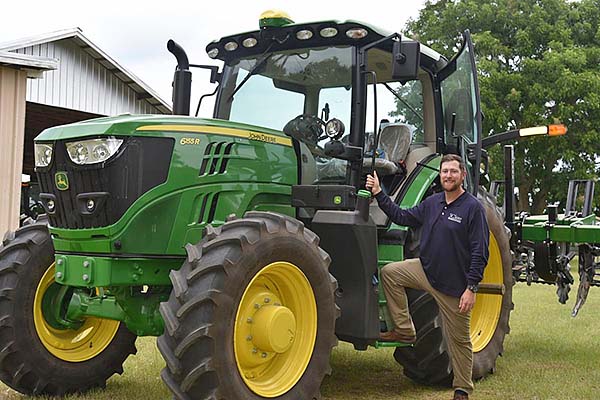
Under the direction of farm manager Zachary Jordan, South Carolina State 1890 Research & Extension is on track to lead the Palmetto State toward a more profitable, sustainable future in an ever-changing smart world.
In 2020, the program announced the purchase of a 200-acre research and demonstration farm in Olar, South Carolina. Since then, the program has been committed to invigorating solutions that improve the industry and supports the states small and minority farmers. Farming is a data-driven industry that relies heavily on hard labor. However, due to the advancement in technologies that labor will eventually pose an issue to farmers; therefore, it is the mission of the university to find innovative ways to get people involved in farming.
“We [1890] get the benefit of the technology, but ultimately, the goal of the Extension team is to pass the information and resources to the people whose livelihoods are most impacted,” Jordan stated. “The work that we do gives a voice to the small farmers who need access to this type of technology as the world moves toward an autonomous future.”
Currently, the farm has two center-pivot irrigation systems used to water the farm's crops and a few John Deere self-automated tractors that support GPS guidance, geofencing and other multi-functionality practices. Both pieces of equipment allow for remote farm management and generate data that is essential for meeting licensing requirements, producing the best quality product and ultimately, increasing profit in the state’s leading industry.
The 1890 Research & Demonstration Farm has invested in multiple John Deere 61-55 R self-automated tractors to manage the large acreage and two center-pivot irrigation systems for hemp, perennial peanut and other crop production.
For more information about the farm or equipment, contact Jordan at zjordan@scsu.edu.
Growing big in small spaces
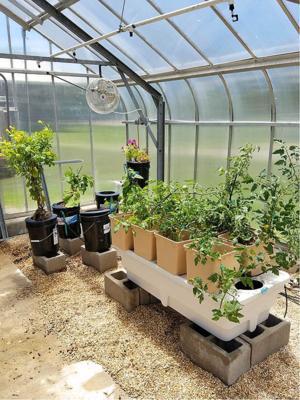
By Marlin Ford, Urban AG Specialist
In many low-income communities, the only places to buy food are fast-food and convenience stores that sell fatty, sugary, processed foods. Some communities have no food vendors of any kind. This lack of access to healthy foods makes it difficult for families to eat well, fueling Louisiana’s growing obesity epidemic and severe health problems.
Most consumers are limited in their ability to access affordable, nutritious foods because they live far from a supermarket or large grocery stores and do not have easy access to transportation. Dr. Marlin Ford (The Urban Doc) and the Ag and Natural Resources (ANR) Extension professionals have begun training small-scale beginning and urban farmers to incorporate controlled environmental agriculture innovations into their small-scale farm operations because the utilization of smaller growth spaces is fundamentally more controllable than a vast span of acreage.
Demonstrating these agricultural control methods (hydroponics, aeroponics and aquaponics) has validated growers that they can drive bigger yields with less effort at a lower cost. Educating our communities with this knowledge has opened the door for fresh, locally grown, affordable and sustainable food year-round for the future.
Preparing youth for tomorrow’s careers
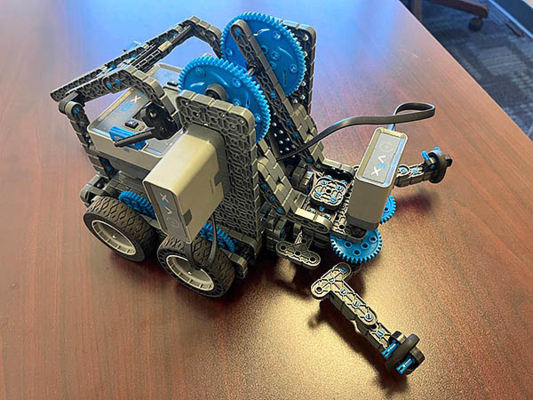
By Dr. Thomas Broyles
News headlines are continuing to read about how robots are helping society. For many years, the industry has been using robots to manufacture automobiles and vacuum our floors, and doctors have been using robots for precision surgeries. In addition, the industry has been developing robots to deliver packages and food to our doorsteps.
As a result, Tennessee State University College of Agriculture’s Extension developed a program for youth to learn about robotics and coding. Youth participate in a series of lessons from building the robot to coding the robot to perform tasks. The building process develops skills in following directions. The building process takes about two-three hours to complete, and the coding process takes about three-four hours to master. During the building phase, youth learn about mechanical engineering concepts such as motors, pulleys and gears. During the coding phase, youth learn about block coding, as well as text-based coding. Youth also learn repeating codes, as well as “if … then…” statements.
Yes, it is true, youth who participate in the Extension robotics program learn about STEM concepts such as force, movement, mathematical computations and computer coding. However, youth who participate in our robotics programs also learn about problem-solving and critical thinking, which are skills highly sought after in the industry. From reading schematics to building the robot to carrying out a command through coding, our robotics programs prepare youth for tomorrow’s careers.
Developing organic farming in the Southeast
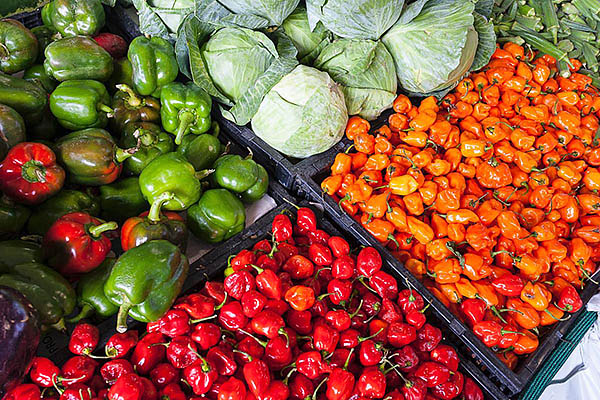
Dr. Franklin Quarcoo is an entomologist and pest management specialist of Tuskegee University’s Organic Program. Since 2009, his research has been heavily focused on organic farming and organic food production. In his work, he emphasizes a collaborative, system-based approach to pest management and other barriers to organic farming that many producers encounter.
Integrated pest management focuses on preventative approaches so that fewer drastic changes to the farm’s ecosystem are necessary. The complete eradication of an insect pest, for example, could not only lead to the proliferation of the pest after its natural enemies starve but also have adverse effects on soil and plant health.
“If you have the ability to eliminate a pest from your farm, don’t do it,” he advises. “You cannot deal with organic farming from a one-discipline perspective. You have to have an appreciation of the [entire] environment.”
Quarcoo works with horticulturists, soil scientists, agribusiness specialists and other professionals to understand the specifics of organic production in the Southeast’s ecosystem.
“Generally, the Southeast’s organic agriculture is not as developed as in some other parts of the country,” he says. To help southeastern producers distribute more organic produce with fewer losses, he collaborates with these professionals to provide research- and data-supported preventative measures to address problems before resorting to far-reaching maneuvers such as inorganic pesticides. He and his cohorts also spread awareness of environmental health and other benefits of organic production practices to increase these practices in the Southeast.
Parker Hannifin donates hydraulic lab equipment to UAPB Department of Agriculture
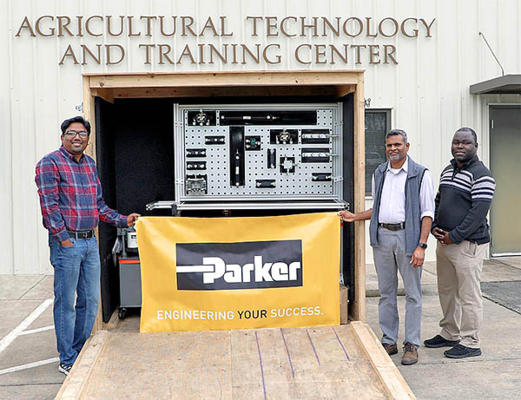
As we transition into the fall semester, we are more ready and prepared thanks to the donation of a hydraulic trainer and basic hydraulic learning modules to the University of Arkansas at Pine Bluff’s (UAPB) School of Agriculture, Fisheries and Human Sciences. The hydraulic trainer, donated by the Parker Hannifin Corporation, will allow a hands-on learning experience for students enrolled in the school’s agricultural engineering degree program to acquire basic skills needed for fluid power applications.
This donation will be beneficial to the development of the curriculum and hydraulic lab facilities of the UAPB agricultural engineering program, which was started in the fall of 2020. The UAPB agricultural engineering hydraulic lab will operate Parker’s hydraulic trainer, allowing for a unique, in-depth understanding of the working of hydraulics. Students will be able to apply theoretical knowledge in a simple and fun way for testing various hydraulic components such as pumps, cylinders and valves.
Students will have the opportunity to obtain classroom knowledge along with real-world, hands-on experiments right at their fingertips. The use of this equipment will be demonstrated to visitors for outreach efforts. It also makes for a unique opportunity for underrepresented minority students to obtain classroom knowledge along with real-world, hands-on experience right at their fingertips.
UMES Extension part of unique partnership with proposed historical site, community
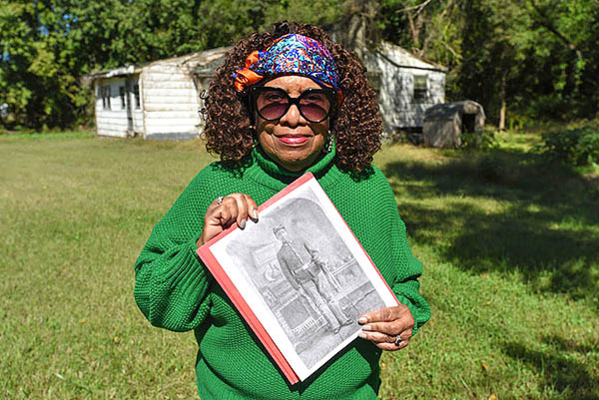
UMES Extension will be an integral part of a project to create a living history site and walking trail to pay homage to a Buffalo Soldier who once called the Eastern Shore of Maryland home. Buffalo Soldiers were Black cavalry and infantry units established by an act of Congress in 1866 primarily to serve as escorts for settlers moving west post-Civil War.
On Oct. 29, ground cover and a path will be laid for Hattie’s Trail in Allen, a piece of some 22 acres that has been in Thomas E. Polk Sr.’s family continuously since 1892 when he purchased the first parcel. A free UMES Extension workshop, “From ‘Useless’ Woods to a Place of Peace and Relaxation,” has been created in association with this first step in the creation of the site. UMES Extension specialists will instruct community members in all of the practical parts to gain the needed experience to transform their backyard woods.
“This part of the project is designed to be a fun learning experience and workout for the whole family, the result of which will be available for the public to enjoy recreationally for years to come,” said Henriette den Ouden, a UMES Extension consultant who will be lending her expertise. Den Ouden was enlisted by Polk’s granddaughter, Deborah Scott of Harford County, to spearhead this phase of Hattie’s Trail, named after her grandmother and wife of Thomas, Harriet Boone Polk.
Participants, den Ouden said, can learn the placement of plants, bushes or trees in a similar area to make it more attractive to people and wildlife.
Agriculture and Natural Resources team uses drone technology to aid landowners, communities
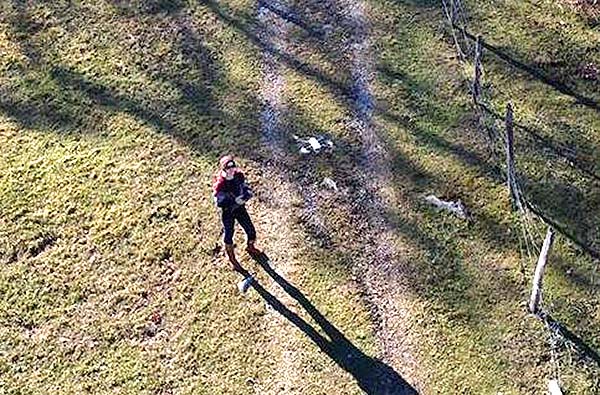
West Virginia State University (WVSU) Extension Service's Agriculture and Natural Resources' spatial mapping programs allow communities and landowners to better manage natural resources through up-to-date aerial imagery using drone technology and on-the-ground GPS inventorying.
For example, operating, removing and planting individual trees are expected in an urban environment. Therefore, communities need a way to map and manage this "green infrastructure." "Our drones capture accurate aerial imagery, supplementing it with street inventories mapping individual trees. These services are usually quite cost-prohibitive for a small community and are the first step to properly managing their trees," said Liz Moss, WVSU Natural Resources Extension educator. "We are also working toward offering communities a means of collecting this data on our GIS account through an online user interface."
These spatial mapping services can allow landowners to map their property accurately and rectify deeds with county assessor records, plan out proper application rates of various chemical treatments (fertilizers and pesticides, for example) based on field area, better estimate supplies for fencing and find and map such features as wells, outbuildings, trails, maple trees for sugaring and other management goals.
